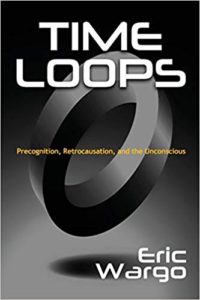UFOs and “Psychic Phenomena”: A TMS Hypothesis
“We are faced with a technology that transcends the physical and is capable of manipulating our reality, generating a variety of altered states of consciousness and of emotional perceptions.” –Jacques Vallee
I’d be the first to admit that there are more things in heaven and earth than are dreamt of in my philosophy. But of all things paranormal, I have the hardest time bringing myself to believe in telepathy and other “psychic” phenomena. Yet such phenomena are a mainstay of alien contact and abduction reports, and have led many researchers—even rigorously scientific ones, like Jacques Vallee—to accept them as an important aspect of many UFO experiences.
The problem as I see it is this: Thoughts take the form of neural activity in the form of activated associations among groups of neurons that encode basic symbols, concepts, and schemas. Effectively, thought at its most basic level is like a language, built from the sequential activation of arbitrary linguistic signs and private and idiosyncratic associations, cascading through our neural architecture. This must be true even of universal or “archetypal” symbols. Thought, in other words, is not something vague and ‘airy.’ It has to be instantiated in material form. This makes me skeptical of the notion of an immaterial “soul” as well. (Spirit is different, but that’s another story.)
Because they arise only in the form of a private language, there is no possibility of thoughts “traveling” outside the brain other than through some form of physical expression (words, gestures, pictures) using symbols. Even a simple symbol could not directly enter the brain except via sensory stimulation—a word or graphic image.
But even if actual thoughts cannot enter or leave an individual’s head, there is another possibility that could, in theory, explain many of the experiences reported by UFO contactees.
Transcranial Magnetic Stimulation (TMS) is a technique now being studied and used by neuroscientists and psychiatrists to induce very specific changes in the cortex. Through rapidly alternating magnetic pulses delivered to the scalp, weak electrical currents can be generated in the brain, and depending on the area stimulated, it can produce sensory effects such as flashes of light and other hallucinations, enhanced creativity and genius-level thought, enhanced perception, religious experiences, as well as distortions of time and memory. It is easy to imagine that, with greater refinements, TMS or something like it could be used to stimulate specific areas of the brain to produce hallucinations of entities and voices and even more specific types of experience.
Unusual electromagnetic effects are very commonly reported in connection with UFOs, and high-power electromagnetic fields are generally regarded to be somehow the basis for their propulsion. What if these objects, or their inhabitants (if there are inhabitants), deliberately or even inadvertently stimulate the brains of witnesses via some sort of remote TMS? It could theoretically explain common aspects of the experience like amnesia, missing time, light effects, strange physical sensations like floating, motor paralysis, and frightening or benevolent entities that take a variety of forms that are sometimes totally bizarre but other times culture-specific or “archetypal.” Not to mention the sensation of psychically receiving thoughts or verbal commands in the contactee’s own tongue.
Hallucinations are very convincing, and seem to arise externally, even though they are produced within the individual’s cortex. TMS could theoretically explain how such experiences could be remotely stimulated but still be the unique product of an individual’s private symbolic and associative language. It would also potentially explain why abduction experiences often involve exactly the experience of sleep paralysis but include a richness of other experiences that are not covered by that rubric.
Again, such effects could be deliberately induced as a form of thought control or manipulation, but they could also be somehow an inadvertent byproduct of proximity to some kind of electromagnetic field having an unrelated purpose like propulsion—who knows. TMS seems at the very least an intriguing possible explanation for the commonality yet uniqueness of abduction experiences, and for “psychic” phenomena, without having to invoke actual thought transferrence and other of the more hard-to-believe aspects of the UFO experience.
Or maybe I’m just being a pedestrian materialist.




Interesting speculation – what if we discarded ET technology altogether and posited anomalous electro-geophysical events (earthlights, ball lightening, etc) as the TMS source? And what if we crossed it with Lovelock’s Gaia hypothesis as seen through a Keelian ultraterrestrial prism?
The ETH hypothesis is no longer necessary as soon as you bring in other elements which contradict its primary causality in these phenomena.